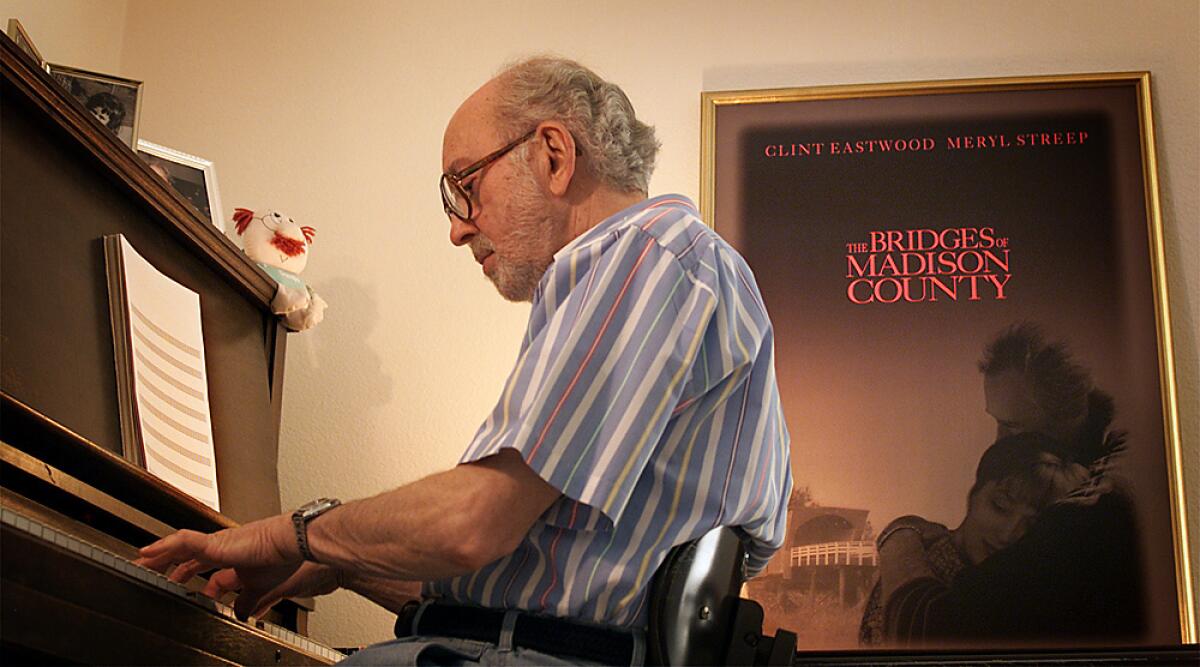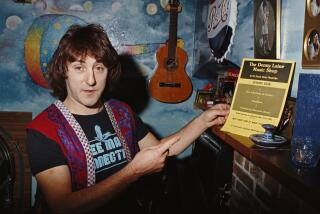Lennie Niehaus, L.A. jazz pioneer and longtime Clint Eastwood composer, dies at 90

Lennie Niehaus, a prominent figure in the 1950s Los Angeles jazz scene and a longtime collaborator with his old Army buddy Clint Eastwood in films such as “Bird” and “Unforgiven,” has died in hospice care at the family home in Redlands.
Active as a composer and a muse to Eastwood until late in life, Niehaus died May 28, said Owen Sheeran, his son-in-law. Niehaus was 90.
In the 1950s when jazz clubs dotted South Los Angeles and fans could have their pick of trumpet players or saxophonists on any given night, Niehaus was a constant along with other fabled musicians — Chet Baker, Hampton Hawes, Shorty Rogers and Bill Holman, among others.
But it was on the road with Stan Kenton that Niehaus earned national exposure as the band leader’s vibrant alto saxophonist. They played together for years, recorded albums and commanded stages from New York City to Los Angeles.
When the crowds thinned out in the 1960s as rock took over the airwaves, Niehaus turned to Hollywood, and ultimately, Eastwood.
Born June 1, 1929, in St. Louis, Niehaus grew up in a musical family. His father played the violin and his sister ultimately became a concert pianist. He took up the clarinet at 13 but put it aside in favor of the alto sax when he began listening to the infectious sounds of big band jazz.
Niehaus came west to study music at Los Angeles State College, now Cal State L.A., and graduated with the school’s inaugural class in 1951.
Intent on making his way as a working musician, he joined Kenton’s band but had to quit when he was drafted. He rejoined Kenton when he was discharged and played with the band leader another five years before the crowds grew smaller and it was clear the musical landscape was shifting.
“I put my horn away and started writing instead,” Niehaus told The Times in 2000.
He found steady work in Hollywood, writing scores for shows such as “Charlie’s Angels” and “McMillan & Wife.” Then he ran into Eastwood, and his career blossomed.
The two had known each other since they were stationed at what then was Ft. Ord, where the future actor was Niehaus’ swimming instructor. They shared a love of jazz.
“He always wanted to be a musician, but a slight acting career got in the way,” Niehaus said.
Starting with “Tightrope,” a 1984 slasher film set in New Orleans, the two forged a partnership that pushed into the next millennium. The list of their work — Eastwood always the director and often actor, Niehaus the composer — was formidable: “Heartbreak Ridge,” “Midnight in the Garden of Good and Evil,” “The Bridges of Madison County,” “Mystic River,” “Million Dollar Baby,” “Letters From Iwo Jima,” “Gran Torino.”
Of all of them though, the 1988 biopic “Bird” may have resonated the deepest. A tribute to jazz legend Charlie “Bird” Parker, it was a shared exercise in affection between the filmmaker and composer.
“Lennie is great because when a movie dictates something simple, he’ll keep it simple or make it complicated when it demands it,” Eastwood told The Times in 1998. “He’s so versatile and smart about the relationship of the music to the movie that I’ve used him on almost every project I’ve done.”
Niehaus eventually put their partnership on full display in a two-hour tribute to the actor’s film legacy at Carnegie Hall, a concert that was eventually released as a live album.
But he never fully put away the sax, taking an occasional gig here or there, even at the local Borders bookstore down the street from his home in Thousand Oaks.
“It’s just what I do.”
Niehaus is survived by his wife, Patricia, daughter Susan, and grandchildren Josh and Emily.
More to Read
Start your day right
Sign up for Essential California for the L.A. Times biggest news, features and recommendations in your inbox six days a week.
You may occasionally receive promotional content from the Los Angeles Times.







